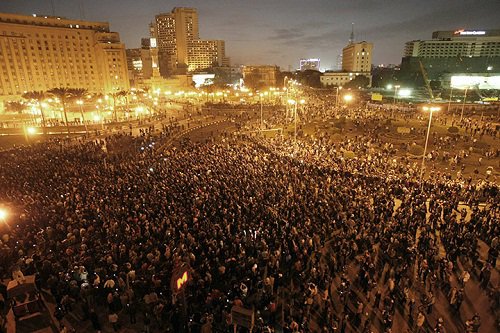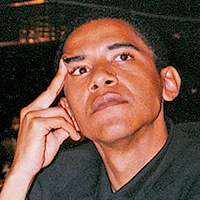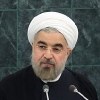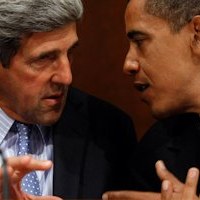![]()
Tue, Feb 01, 2011 | The Rubin Report | By Barry Rubin
Egypt’s Revolution: A Simple Guide
There’s a lot of confusion about the Egyptian crisis yet it is vital people understand what is at stake.
The first issue is whether only the ruler or the entire regime is going to fall. The mere resignation of President Husni Mubarak from office would not be a huge problem. Vice-President Omar Suleiman or someone else will take over, the regime will make adjustments to build support (and probably repression of the Muslim Brotherhood) and Egypt’s policy—certainly its foreign policy—remains relatively unchanged.
But if the entire regime falls this would lead to a period of anarchy—bad—or a new regime—worse. There are three huge problems:
The moderates’ weakness. There are no well-organized moderate groups with a big base of support. Can any such politicians compete with the highly organized, disciplined Muslim Brotherhood which knows precisely what it wants? Indeed, the much-touted Muhammad ElBaradai is a weak and ineffectual man with no political experience whatsoever. Many of the activists who have backed his candidacy are themselves Islamists.
Indeed, many of the non-Islamist “moderates” are not so moderate. In sharp contrast to reformers in other Arab countries, many of the Egyptian “democrats” are themselves quite radical, especially in terms of anti-American and anti-Israel thinking.
ElBaradai, by the way, is mainly known for being very soft on Iran when he was running the investigation of its nuclear weapons’ campaign. As Egypt’s leader, if that happens, he would clearly be friendly toward Tehran. How could the United States build any serious coalition against Iran without either Egypt or Turkey?
The public’s radicalism. According to a recent Pew poll, the Egyptian public is extremely radical even in comparison to Jordan or Lebanon. When asked whether they preferred “Islamists” or “modernizers,” the score was 59% to 27% in favor of the Islamists. In addition, 20 percent said they liked al-Qaida; 30 percent, Hizballah; 49 percent, Hamas. And this was at a time that their government daily propagandized against these groups.
How about religious views? Egyptian Muslims said the following: 82 percent want adulterers punished with stoning; 77 percent want robbers to be whipped and have their hands amputated; 84 percent favor the death penalty for any Muslim who changes his religion.
So how is such a radical public going to vote and what policies would they support? The Muslim Brotherhood is likely to be very popular while one would think secular moderates in suits and ties would not be able to compete in elections.
The economy’s fragility. In a country like Saudi Arabia a government can buy off opposition. Not so in Egypt, a place where there are few resources (some oil, Suez Canal) and too many people. So how is a government going to make the public happy? It won’t be able to offer greatly improved living standards, more jobs, and better housing. Instead, demagoguery is likely—as it has so often done before in the Arab world—to be the means of gaining votes and keeping the masses out of the streets.
This means the Islamization to some degree of social life and waves of hatred against Israel and America, the Middle East equivalent of bread (subsidies for food will be increased but how to pay for them?) and circuses. Moderate governments thrive usually when they can offer benefits. This is very unlikely in Egypt.
The Islamists’ strength and extremism. If someone tells you that the Muslim Brotherhood is mild and moderate, don’t believe it. In its speeches and publications, it pours forth vitriol and hatred. Making the Sharia the sole source of legislation for Egypt is one of its most basic demands. The rights of Christians and women (at least those who don’t want to live within radical Islamist rules) are going to decline in a country ruled by the Brotherhood, even as part of the coalition.
As for foreign policy, is the alliance with the United States and the peace treaty with Israel going to survive under such a regime? Maybe but why should that happen? And of course, the regime will support revolutionary Islamists elsewhere. Even ElBaradei wants an alliance with Hamas. Such a regime will not be friendly toward the Palestinian Authority or oppose Iranian expansionism (even though it might well hate Iran as Shia Muslims).
And what will the effect be on the rest of the region? Everyone will know—both Israel and moderate Arabs alike—that they cannot depend on the United States. Revolutionary Islamists would be emboldened to subvert Morocco and Tunisia, Jordan and Saudi Arabia. With an Islamist-ruled Lebanon (for all practical purposes, if only unofficially), Gaza Strip, Iran, Turkey, and with Syrian participation, what will happen in the Middle East?
The worst kind of disaster is one that isn’t recognized as such.
Again, this has nothing much to do whether Mubarak himself stays or not and everything to do with whether the Egyptian regime stays or not.



 RSS
RSS











#Egypt's #Revolution: A Simple Guide | #ElBaradei #Mubarak #US #Islamism http://j.mp/hlYfUc
RT @CrethiPlethi: #Egypt's #Revolution: A Simple Guide | #ElBaradei #Mubarak #US #Islamism http://j.mp/hlYfUc